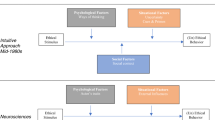Abstract
Previous research has shown that cognitive style impacts several areas of human behavior of interest to marketers. This article reports the results of an exploratory study testing the proposition that cognitive style can influence one's perceptions of what is and is not a matter of ethics. The findings indicate that cognitive style can play a role in one's perceptions of ethics, and may help further our understanding of the factors that bear on ethical points of view.
Similar content being viewed by others
References
Beltramini, R. F., R. A. Peterson, and George Kozmetsky: 1984, ‘Concerns of College Students Regarding Business Ethics’,Journal of Business Ethics 3, 195–200.
Carlson, R. and N. Levy: 1973, ‘Studies of Jungian Typology: I. Memory, Social Perception, and Social Action’,Journal of Personality 41, 559–76.
Dubinsky, A. J., E. N. Berkowitz, and W. Rudelius: 1980, ‘Ethical Problems of Field Sales Personnel’,MSU Business Topics 28, 11–16.
Dubinsky, A. J. and T. N. Ingram: 1984, ‘Correlates of Salespeople's Ethical Conflict: An Exploratory Investigation’,Journal of Business Ethics 3, 343–53.
Fleming, J. E.: 1985, ‘A Suggested Approach to Linking Decision Styles with Business Ethics’,Journal of Business Ethics 4, 137–144.
Frisbie, G. R: 1988, ‘Cognitive Styles: An Alternative to Keirsey's Temperaments’,Journal of Psychological Type 16, 13–21.
Grant, E. W., Jr. and L. S. Broom: 1988, ‘Attitudes Toward Ethics: A View of the College Student’,Journal of Business Ethics 7, 617–19.
Greig, I.: 1984, ‘Basic Motivation and Decision Style in Organization Management’,Omega 12(1), 31–41.
Hellriegel, D. and J. W. Slocum, Jr.: 1975, ‘Managerial Problem-solving Styles’,Business Horizons (December), 29–37.
Holt, D. A.: 1975, ‘Use of MBTI in Management Training’, paper presented at the First National Conference on the Myers-Briggs Type Indicator, Gainesville, Florida, October.
Jung, C. G.: 1971,Psychological Types (H. G. Baynes, trans., rev. R. F. C. Hull.), (Princeton University Press, Princeton, NJ).
Keen, P. G. W. and G. S. Bronsema: 1981, ‘Cognitive Style Research: A Perspective for Integration’, inProceedings of the Second International Conference on Information Systems (Sloan School of Management, Massachusetts Institute of Technology, Cambridge, MA).
Kilmann, R. H. and K. W. Thomas: 1975, ‘Interpersonal Conflict-Handling Behavior as Reflections of Jungian Personality Dimensions’,Psychological Reports 37, 971–80.
Kilmann, R. H. and I. I. Mitroff: 1976, ‘Qualitative Versus Quantitative Analysis for Management Science: Different Forms for Different Psychological Types’,Interfaces 6(2) (February), 17–27.
Levin, L. S.: 1978, ‘Jungian Personality Variables of Psychotherapists of Five Different Theoretical Orientations’, unpublished doctoral dissertation, Georgia State University,Dissertation Abstracts International 39, 4042B-4043B.
Levy, M. and A. J. Dubinsky: 1983, ‘Identifying and Addressing Retail Salespeople's Ethical Problems: A Method and Application’,Journal of Retaililng 59(1) (Spring), 46–66.
Lowen, W.: 1982,Dichotomies of the Mind: A Systems Science Model of the Mind and Personality (John Wiley and Sons, New York).
McCaulley, M. H. and F. L. Natter: 1974, ‘Psychological (Myers-Briggs) Type Differences in Education’, inThe Governor's Task Force on Disruptive Youth: Phase II Report (Office of the Governor, Tallahassee, FL).
McIntyre, R. P.: 1991, ‘The Impact of Jungian Cognitive Style on Marketing Interactions’, unpublished Doctoral dissertation, Arizona State University.
Mitroff, I. I. and R. H. Kilmann: 1975a, ‘On Evaluating Scientific Research: The Contribution of the Psychology of Science’,Technical Forecasting and Social Change 8, 163–74.
Mitroff, I. I., V. P. Barabba, and R. H. Kilmann: 1977, ‘The Application of Behavioral and Philosophical Technologies to Strategic Planning: A Case Study of a Large Federal Agency’,Management Science,24(1) (September), 44–58.
Mitroff, I. I.: 1981, ‘Is a Periodic Table of the Elements for Organization Behavior Possible?’,Human Systems Management 2(3), 168–76.
Page, E. C.: 1983,Looking at Type (Center for Applications of Psychological Type, Gainesville, FL).
Smith, A. W. and T. F. Urban: 1978, ‘Myers-Briggs Personality Orientations and Information Processing Styles: Implications for Management Education and Development’, paper presented at the National Academy of Management, MED Session, San Francisco, August 10.
Thompson, L. L.: 1984, ‘An Investigation of the Relationship of the Personality Theory of C. G. Jung and Teachers' Self-Reported Perceptions and Decisions’, unpublished Doctoral dissertation, Ohio State University.
White, K. B.: 1984, ‘A Preliminary Investigation of Information Systems Team Structures’,Information and Management 7(6) (December), 331–5.
Williams, C., D. Armstrong, and C. Malcolm: 1985,The Negotiable Environment; People, White-Collar Work, and the Office (Facility Management Institute, Ann Arbor, MI).
Author information
Authors and Affiliations
Additional information
Roger P. McIntyre is Assistant Professor of Marketing at East Carolina University. He has published in theJournal of Macromarketing, theJournal of Travel Research, theInternational Marketing Review, theJournal of Euromarketing, and numerous proceedings. His research interests center on the influence of cognitive style on marketing relationships.
Margaret M. Capen is an Associate Professor of Decision Sciences at East Carolina University, with a Ph.D. in Economics. She has published in such journals asApplied Economics, Journal of Industrial Relations, andThe Real Estate Appraiser. Her primary research interest is in applied linear models.
The authors thank Michael P. Mokwa for his guidance.
Rights and permissions
About this article
Cite this article
McIntyre, R.P., Capen, M.M. A cognitive style perspective on ethical questions. J Bus Ethics 12, 629–634 (1993). https://doi.org/10.1007/BF01845901
Issue Date:
DOI: https://doi.org/10.1007/BF01845901




